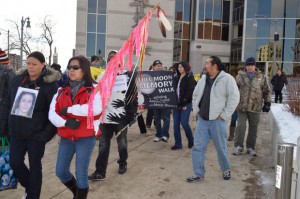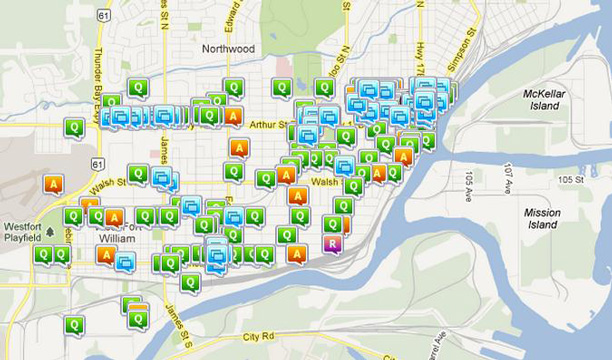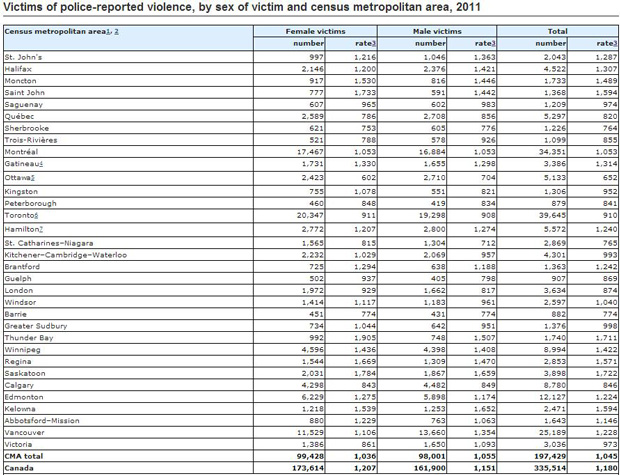 THUNDER BAY – Is Thunder Bay a danger zone for women? Several groups have raised concern over the levels of violence against women in Thunder Bay. Those concerns appear to be valid, at least according to the latest figures from Statistics Canada.
THUNDER BAY – Is Thunder Bay a danger zone for women? Several groups have raised concern over the levels of violence against women in Thunder Bay. Those concerns appear to be valid, at least according to the latest figures from Statistics Canada.
Thunder Bay violence rates nearly double the average
The agency reports, “In 2011, Thunder Bay and Saskatoon recorded rates that were nearly double the average among census metropolitan areas (CMA). Saint John and Regina had the next highest rates of violence against women. The CMAs with the lowest prevalence rates were all situated in Ontario and Quebec”.
“Among CMA’s; rates of violence against women follow a similar pattern as violence in the overall population”.

The rate, calculated per 100,000 population has Thunder Bay with 1,905 reports per 100,000 people.
Among the three largest CMAs, Vancouver recorded the highest rate of violence against women with a rate of 1,106 per 100,000 population.
While lower than the national average, Vancouver’s rate was 5% higher than Montreal and 21% higher than Toronto.
“According to police-reported data, just over 173,600 women aged 15 and older were victims of violent crime in 2011, a rate of 1,207 female victims for every 100,000 women in the population”.
“Aboriginal people, including women, are often over-represented as victims of violent crime, including lethal forms of violence (Perreault 2011, Brennan 2011). While there are limitations in examining Aboriginal identity of victims using the Incident-based UCR Survey, analysis is possible using the Homicide Survey. An important caveat is the high level of homicide incidents where the Aboriginal identity was unknown”.
The issue of violence and crime in Thunder Bay have led to the creation of the crime prevention council. Mayor Keith Hobbs has formed a Mayor’s task force as well. The Thunder Bay Police Service have an Aboriginal Liaison Unit.
Crime Map Thunder Bay

The Crime Map offers individuals an opportunity to view the crimes, and the types of crimes happening in the city. The interactive map, allows users to check their neighbourhoods, Using the crime figures, you can also have a window into what is happening in your neighbourhood, around your workplace, or in the areas you shop during the day, or go to party at night.
Over the past 48 hours, in the southward of the city, for example there were 36 incidents recorded on the crime map in the southward, and 28 incidents reported on the north side of the city.
The Thunder Bay Police do not provide a daily update of crime in the city like many other police services do. In Grande Prairie for example, where the RCMP provide policing to the community of 55,000. A daily summary of all calls for service is provided to the public.
Between 4:00 p.m. Wednesday February 20, 2013 and 7:00 a.m. today, Thursday February 21, 2013 the Grande Prairie RCMP received 50 reports and/or calls for service of which include:
- 1 reported 911 call
- 1 report of abandoned vehicle
- 1 report of assault
- 2 reports of break and enter
- 3 reports of disturbing the peace
- 3 reports drug related
- 1 report fail to obey court order
- 3 reports of false alarm
- 2 reports of harassment
- 1 report of liquor act violation
- 4 reports of lost and found items
- 1 report of mischief
- 2 reports of municipal by-law infractions
- 3 reports of suspicious person/vehicle
- 4 reports of theft including: theft of a 2004 Dodge Ram
- 8 reports traffic related including 5 motor vehicle collisions
- 10 reports ( assist general public, provincial acts)
Thunder Bay Police Service used to supply that information to the public. Sources report that this was discontinued. Thunder Bay Police Service remains one of a growing minority of police services in North America to utilize or branch out into social media, or apparently into understanding the opportunities that the new mediums can offer in terms of community engagement.
Despite Aboriginal women representing about 4% of the population in 2006, between 2001 and 2011, Aboriginal women accounted for at least 11% of dating homicide victims and at least 10% of non-intimate partner homicide victims

The proportion of Aboriginal women killed by a spouse (4%) was similar to their representation in the total population. Common assaults accounted for about half of all police-reported violent crimes against women. They were followed by uttering threats, which represented another 13%, serious physical assaults (10%), sexual assaults involving little to no physical injury (7%), and criminal harassment (stalking) (7%).
The rate of police-reported violent crime against women was about 5% higher than the rate for men in 2011. Except for sexual assault and criminal harassment, women and men tended to be victims of similar offences.
Women were 11 times more likely than men to be a victim of sexual offences, and 3 times more likely to be the victim of criminal harassment.
Between 2009 and 2011, rates of police-reported physical assaults against women, including common assaults and serious physical assaults, fell 5% to 705 victims per 100,000 women. Police-reported data also show a drop in rates of attempted murders against women over this same three-year period.
The rate of police-reported sexual assaults against women remained stable in 2011 after increasing between 2009 and 2010. The 2009 General Social Survey (GSS) on victimization, which provides information on self-reported incidents of victimization that are both reported and unreported to police, showed that a significant proportion of sexual assaults are not reported to police.
The rate of homicides against women, generally considered a barometer of violent crime, has been relatively stable since 2000. In the three decades prior to 2000, the rate had declined 58%.
Thunder Bay Police Chief JP Lesveque has not commented on the release of the latest crime figures.








